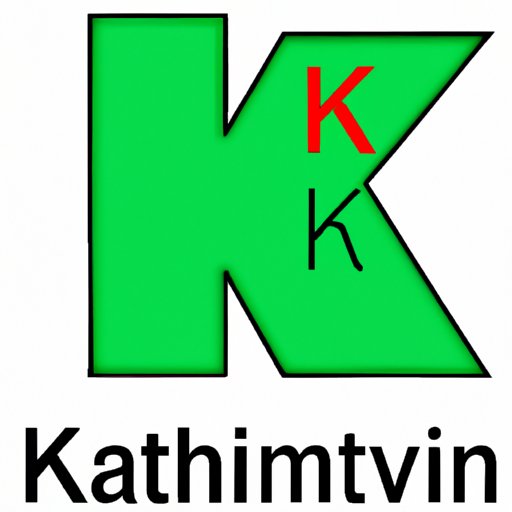
I. Introduction
Vitamin K is a vital nutrient that is required for blood clotting, bone health, and other critical bodily functions. It is a fat-soluble vitamin that is found in many different foods and is also produced by the body. In this article, we will explore the various benefits of vitamin K, its food sources, recommended daily intake, and potential risks of supplementation. Whether you are looking to boost your overall health or have a specific health concern, this article will provide you with a comprehensive guide on all things vitamin K.
II. The Power of Vitamin K: Understanding Its Role in Blood Clotting and Beyond
One of the primary functions of vitamin K is to help with blood clotting. When you get injured, the body forms a clot to stop the bleeding. Vitamin K is required for the production of specific proteins that are necessary for the formation of these blood clots. This crucial process is known as the coagulation cascade.
It is important to mention that blood-thinning medications such as warfarin work by blocking the action of vitamin K. This medication is prescribed to people with medical conditions such as deep vein thrombosis, pulmonary embolism, and atrial fibrillation. However, the use of warfarin requires careful management, as too much or too little can be dangerous and can lead to bleeding or clotting issues.
Besides its role in blood clotting, studies have shown that vitamin K also has an impact on inflammation and the immune system. Research suggests that it may help to reduce inflammation and may even boost your immune system’s response to infections.
III. From Vision to Heart Health: The Versatility of Vitamin K
Vitamin K may also have significant benefits for eye health. Studies have shown that vitamin K plays a role in preventing age-related eye diseases such as macular degeneration and cataracts. It is thought that it may help by reducing oxidative stress and inflammation within the eyes.
Heart health is another area where vitamin K shines. Recent studies have found that adequate intake of vitamin K may help reduce the risk of heart disease. One study showed that people who consumed more vitamin K were less likely to die from heart disease than those who consumed less.
Research also suggests that vitamin K may help to prevent the buildup of calcium in blood vessels, a crucial factor in the development of heart disease.
IV. The Benefits and Risks of Vitamin K Supplementation
Vitamin K supplements come in two different forms: vitamin K1 and vitamin K2. Vitamin K1 is primarily found in leafy green vegetables, while vitamin K2 is found in animal products and fermented foods.
One of the significant advantages of supplementation is that it may help to maintain adequate levels of vitamin K in people who are not getting enough from their diet. However, it is essential to note that taking too much vitamin K can have adverse effects, including interfering with blood-thinning medication. Therefore, it is crucial to consult with a healthcare professional before taking any supplements.

V. Vitamin K and Bone Health: What You Need to Know
Vitamin K also plays a significant role in maintaining healthy bones. Studies suggest that it may help to prevent osteoporosis, a condition that causes bones to become weak and brittle due to a loss of bone density.
Sufficient intake of vitamin K may help to improve bone mineral density, which is essential for maintaining healthy bones. This is because vitamin K helps activate osteocalcin, a protein that is required for bone mineralization.
VI. Getting to Know Vitamin K: A Comprehensive Guide on Its Sources and Functions
There are many different food sources of vitamin K, including leafy green vegetables, such as spinach, kale, and collard greens, broccoli, Brussels sprouts, soybeans, and fermented foods like natto, a traditional Japanese dish made from fermented soybeans.
The recommended daily intake of vitamin K varies depending on age and gender. Adults require between 90 to 120mcg per day. Pregnant and breastfeeding women require slightly higher amounts.
Besides its role in blood clotting, inflammation, heart health, and bone health, vitamin K may also help to regulate blood sugar levels, improve brain function, and reduce the risk of some types of cancer. More research is needed to confirm these benefits.
VII. The Link Between Vitamin K and Brain Health: Exploring the Latest Research
Recent studies have shown that vitamin K may also have a significant impact on cognitive function, memory, and may even help to prevent Alzheimer’s disease. One study found that people with Alzheimer’s disease had a lower level of vitamin K in their blood than people without the condition.
While the research is still in its early stages, these findings suggest that maintaining adequate levels of vitamin K may be an essential factor in maintaining good brain health as we age.
VIII. Vitamin K Deficiency: Causes, Symptoms, and Treatment Options
Vitamin K deficiency is rare in healthy adults, but it may occur in people with certain medical conditions or those who are taking medication that interferes with vitamin K absorption. Symptoms of vitamin K deficiency include excessive bleeding or bruising, nosebleeds, and blood in urine or stool.
The treatment for vitamin K deficiency may involve increasing dietary intake of vitamin K rich foods or taking a vitamin K supplement. In severe cases, intravenous administration of vitamin K1 may be necessary.
IX. Conclusion
Vitamin K is a crucial nutrient that plays a vital role in many different bodily functions, including blood clotting, bone health, heart health, and brain function. Maintaining adequate levels of vitamin K is essential for overall health and can be achieved through a healthy and balanced diet that includes plenty of vitamin K-rich foods. While supplementation can be beneficial, it is essential to consult with a healthcare professional before taking any supplements.
By understanding the benefits of vitamin K, you can take positive steps towards improving your health and wellbeing for years to come.





